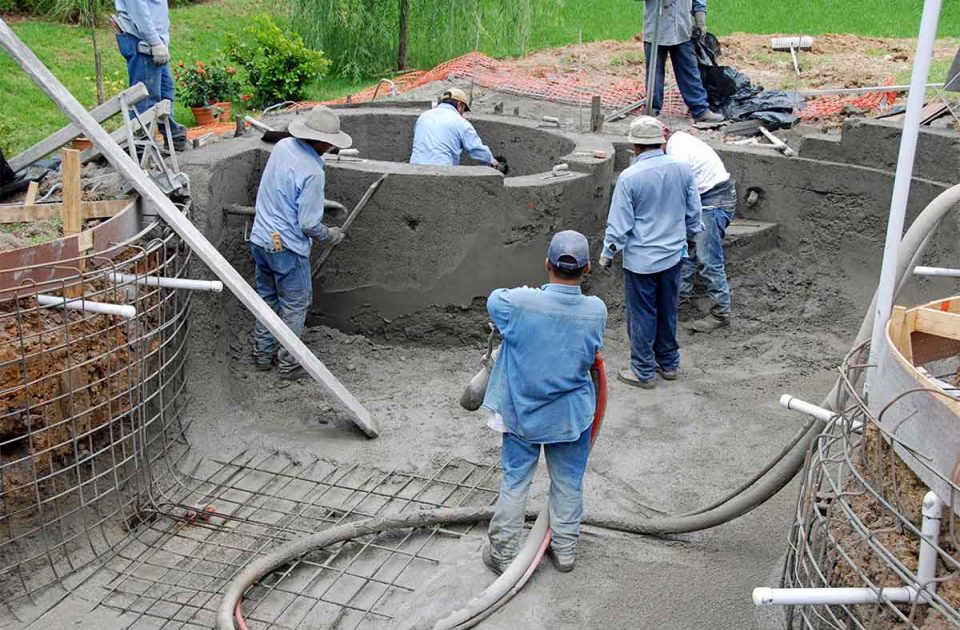Building a Pool in Dallas
Building an inground swimming pool is one of the most exhilarating features a house can have. With a pool, a backyard may be suddenly transformed into a sun-drenched haven for people of all ages to enjoy. There is no doubt that an inground pool is a major investment of time and money. The pool industry grew 40% between 2020 and 2022, consequently the new of inground pool installations has gone up dramatically and is becoming more expensive to build, according to Pool Magazine.
Six crucial steps to follow if you’re ready to take the plunge and obtain an inground swimming pool for your house and family are as follows:
Types of Inground Pools Homeowners Build in Dallas
Inground pools come in three primary varieties. Concrete, vinyl-lined, and fiberglass are the most prevalent. It’s possible to find steel- or aluminum-walled swimming pools in very specific areas of the country. Seeing as we are a gunite pool builder and completely focus on high-end custom pools, we’ll speak on the benefits of concrete pools.
Benefits of Concrete Pools
Concrete pools can be made in practically any shape or depth, and they are really custom-built. Concrete is fired from a gun into steel-reinforced walls to create these pools, which are commonly referred to as Gunite or Shotcrete pools. Plastering, painting, and tiling are all options for completing the pool when it has dried and hardened.
It is 100% true that installing a concrete pool takes longer than any other (between three and twelve weeks on average), but the end result is stronger and more long-lasting. Many concrete pools are still in operation today that are more than 50 years old. Existing concrete pools can be renovated, expanded, and modernized, which is not possible with other forms of inground pools.
If you’re unsure about the type of pool you want, consult with a local pool builder like Horizon Pools for advice. For a company to specialize in one style of pool, there must be a very compelling reason for it. (The climate and soil conditions in the area are typically factors.) Choose the type of pool you want, and then talk to a builder who has experience installing that particular style of pool you chose to have installed.

Comparisons of costs for Pool Construction
Prices vary greatly based on where you live, soil conditions, materials, and features. Consequently, the prices are primarily dictated by the size and depth of the pool, so estimating a specific cost is impossible. For estimating a ballpark cost for a basic perimeter-sized concrete pool expect to spend between $60K-$100K. Depending on the time of year, the ultimate cost of a pool might also be affected by the availability of contractors.
Concrete pools tend to be the most expensive, followed closely by vinyl-lined pools and finally fiberglass ones. High-end fiberglass pools can be more expensive than more basic concrete ones, but they’re also more luxurious.
Here in Dallas, where our company builds pools, a typical rectangular 20 x 40 foot concrete pool costs approximately $60,000, including the filtration system, first water fill-up, underwater lights, and stone coping around the pool’s perimeter. Fencing, landscaping, decking, and other pool-related expenses are not included. Remember that most homeowners spend twice as much money on their swimming pool makeover as they did on the pool itself. So, if you buy a $60,000 pool, you could expect to spend an extra $40,000 to $50,000 before the project is truly complete.
What to know before you begin building a pool in Dallas, TX
Before beginning construction on an inground pool, you must obtain a building permit and have it approved by the local zoning authority. Certain setback distances must be maintained between the pool and property lines, septic tanks, wells, sewage lines, and wetlands, depending on the town’s building and zoning regulations. Pool fencing and gate hardware are also subject to regulations.
Additional Costs & Considerations
Perimeter walls and fences should be at least four feet high and feature self-closing, self-latching gates as a minimum requirement. Boards or balusters on a fence should not be more than four inches apart. Only 1-1/4 in. wide chain-link fence openings are permitted.
Starting with automated pool covers, door and window sensors, underwater lights, and a heater, there are a number of additional charges that may or may not be required depending on the area in which the home is located. Pre-existing variables, such as trees that need to be cleared, or concealed utilities that need to be relocated, also need to be taken into consideration.
A electric safety cover over the pool and alarms on all house doors and gates leading to it are two further precautions you might want to take if you have young children or grandchildren. Contact your local building department or zoning board for a complete list of rules and regulations.



